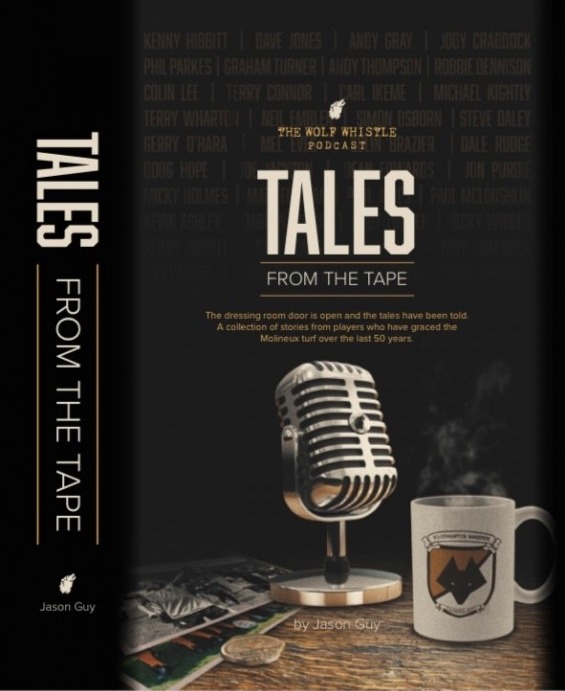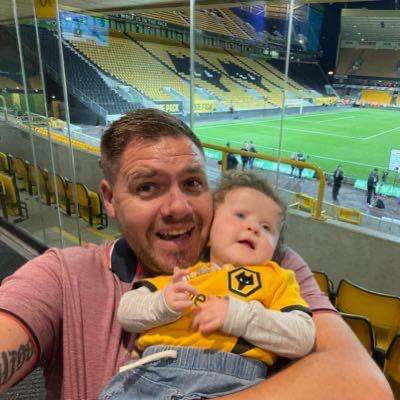
TALES FROM THE TAPE
COLIN BRAZIER
THE NEARLY MAN
Colin Brazier was piecing together my kitchen and looking for some screws that had been misplaced when he looked up cheerfully and asked me: “Where did it all go wrong?”
For Colin, it didn’t. Described by his peers as confident, classy, calm and collected, Colin took it all in his stride and his composure oozed out with a ball at his feet.
“I was born near the Birmingham City ground in Small Heath,” he says. “My father was a staunch Bluenose and he went to every game and took me too when I was growing up. I remember being in the Tilton End and gazing onto the pitch in awe.”
It wasn’t long before Colin was kicking a ball himself.
“I started playing at the age of six and my father really supported me. He took me everywhere, I was very lucky. If I’d had a bad game, he wouldn’t berate me after matches like some of the parents. He’d explain things to me, he was very patient.”
Colin was ahead of his time even back then. At the age of 14 he was playing his Sunday football against men. Coming off the pitch bruised and battered to a devoted father who wanted the best for him. “He never pushed me, in fact his words to me were to get a trade.” Colin became an apprentice plumber, a career he could fall back on long after the boots were hung up. At 16, Colin was given his opportunity to ditch the adjustable spanner and follow his dream.
“We received a call at home and it was Derby County. They had some greats in the team like Roy McFarland, Colin Todd and Kevin Hector and I couldn’t believe my luck. My father put the phone down, we started to talk and then 15 minutes later the phone rang again. This time it was Wolves calling… I should have waited another 15 minutes before saying yes, it may have been Blues on the phone next!”
Colin sat down with his father and concluded that the pathway to the first-team at Derby would have been a million miles away – he feared that he would have never been given an opportunity in a team of international players. At Wolves, although the names dropped off the tongue, Colin could at least see a glimmer of light in making it as a professional and couldn’t wait to get started.
“I downed tools and joined the Wolves,” Colin said, smiling. “I got my opportunity initially in the youth team and then the reserves, signing professional for the club at the age of 18.”
Colin relished this huge opportunity in the Old Gold and was quickly playing against some of the heroes that he had grown up watching. “I was a regular in the reserves and to me it was the best league after the First Division. It was at the time the reserve teams would be full of first-teamers trying to get fit. I was playing against the likes of Kenny Dalglish, Francis Lee and Joe Jordan. And these players would take their time to talk you through the game if you were a young man. Francis Lee for example would tell me what to do, where I’d gone wrong, what I should have done even though I was playing against him – it was a real help.”
Joe Jordan though taught a young Colin Brazier another lesson entirely. “We had played Manchester United reserves at Old Trafford and the backs of my calves were cut to pieces at the end where Joe had left his studs!”
Colin’s father was still watching him, attending all the games he could but was beginning to show concern. “You need to look after yourself son,” was the warning from Brazier senior. Colin eventually learned, but as ever it was the hard way.
“I was playing against a player called Andy Lockhead, a real bruiser of a centre forward. Typical old-fashioned striker who used to knock the centre halves about like they weren’t there. I remember getting an elbow and a kick and giving one back, and Andy would scream at me: ‘That’s not how to do it son!’ The next time, I went in harder, left an elbow him and cut him. ‘That’s better’, he replied, ‘that’s how to do it.’ ”
Colin concedes that he has a lot to thank Mr Lockhead for. “He helped toughen me up. The refs also played their part although they wouldn’t protect you like today. If tackles were up to neck-high you’d get a warning and anything over the neck they would blow up for!”
The reality was, that wasn’t Colin’s game and the opposition knew it. Part of his strengthening programme was to run up and down the South Bank with weights or around the hills of Cannock Chase to build up stamina, much different to the training regimes of today which he believes he would have been more suited to.
“We would play first team versus reserves on a Thursday and kick lumps out of each other, then expect to be fully fit for Saturday. The pitches were so different too. I’d have loved to have played today and it would have suited my game completely – I was a footballer.”
Make no mistake, Colin was exactly that. He made his debut the age of 19 in 1977 against Ipswich Town. “It was everything that I had dreamt about as a kid. I was playing against and marking Paul Mariner. My first touch was in the six yard box where I trapped the ball and whilst under pressure controlled it and back heeled it to Lofty (Phil Parkes). It just all felt so natural, even on the stage I was now on.”
Colin recalled the poor quality of the pitches and watching the great George Best trawl through six inches of mud and still make the game look easy. “I’d have loved to have played now, everything would have suited my game. I remember playing against West Brom reserves one game. The ball had beat the keeper and was heading for the goal. I trapped the ball on the goal line, nutmegged the incoming striker… and got the biggest rollocking I’d ever had at full time, but that was my game!”
Similarly against Villa reserves he had been kept on a short leash. “I walked the ball out, played three one-two’s with my team mates, beat the keeper to score to be told I shouldn’t be going over the halfway line and to imagine there was a piece of twine around my waist that only reached the halfway point of the pitch.”
Colin felt stifled with the way he was told to play. The confusion then came when Colin was given the unforgiving ‘utility’ tag. “I was a centre half, a ball playing centre half. Because of my skill I’d be asked to play in midfield but I didn’t have the engine for that. It wasn’t me.”
At Wolves Colin wore almost every shirt including the green of the goalkeeping one. “We were playing against AEK Athens and Paul Bradshaw had gone down with a bad stomach, so I got the gloves on and we drew 2-2.”
The utility tag though can weigh heavy around the necks of players who sadly succumb to the label. They are often played out of position or second-fiddle to those that have mastered their particular craft and are recognised for that position.
It was at what should have been Colin’s biggest stage, on the bowling green that is Wembley Stadium in March 1980, his finest hour. He is subdued in his summing up of the day.
“Better than being the 13th man like Norman Bell was,” he started optimistically.
“I didn’t feel part of it to be honest. There was only one sub in those days and I suppose I was lucky it was me as it could have been Norman, but as Norman was an out-and-out striker and I could play in various positions, I got the nod.”
The utility tag was somewhat beginning to work in his favour, then instantaneously going against him. “I didn’t get on. Two minutes on the pitch would have done it, even 30 seconds and not touching the ball I’d still have felt part of it. My family were there, the pitch was pristine and I remember saying to myself – I could have done anything on that pitch today.”
Colin, who played in the earlier rounds of the competition, never got his chance but still fondly retains his winning tankard as a memento of the day which clearly leaves bittersweet memories on what could have been his ‘sans pareil’.
It could though all have been in the white of Leeds United. The Peacocks had been watching their man for six months, unbeknown to Colin as his father had kept it a secret from him to not take his mind off his game. Eventually it was Jimmy Armfield who made the move to try and sign Colin.
“My Dad started the car to drive me up to Elland Road one morning,” says Colin. “But just as we were about to set off, my Mom ran out the house after receiving a call to tell us that Jimmy had been sacked. It was particularly difficult to take because, as a player, if you have been bought, you know you are wanted. I wanted that feeling but it just wasn’t to be.”
It was then Colin chuckled: “if I didn’t have bad luck, I’d have no luck at all.” The golden goal then quickly began to fade for Colin at Molineux, but it wasn’t before a chance move Stateside that he finally got the chance to live that dream.
“Wolves had been on tour to the States the previous year and the opposition must have liked what they saw,” Colin says. “It’s quite funny how it all turned out really. I was on my way to a family holiday in Madeira. We boarded the plane in Birmingham but it had a cracked windscreen and was grounded at Luton. I called the club to let them know what was happening and was told by Ian Greaves that there was an opportunity to go to America. I never looked back. I went back home, left my family to continue their holiday and I went and signed for the Jacksonville Tea Men in America.”
It all came as a bit of a surprise for Colin and clearly the family too. “I’d scored eight goals in various reserve games that week for Wolves so was surprised when they let me go but it was an opportunity I couldn’t turn down. I was there for two years and had a fantastic life there living just off a golf course. I was in the same side as Tony Brown, Archie Gemmill and Keith Bertschin. I’d be playing against Cruyff, Neeskens, Gerd Muller, Beckenbauer and it really was an amazing experience. There was even a player called Jorge Berrio there! Not quite George Berry but close enough and I really felt at home knowing that.”
The only drawback for Colin was that, once again, the pitches weren’t always to his liking. “We would be playing on baseball grounds, so you’d be running with the ball and then hit a hump in the pitch. The rules were strange too. There was a 35-yard line which sat just a few yards away from the halfway line that you couldn’t be offside in. There were no drawn games – straight to penalties, well it was a timed 10-second run from the 35 yard line where you had to beat the keeper. There was also a time-out for commercials, but other than that I really enjoyed everything on and off the pitch there.”
Colin further explained the cultural differences between his team mates. “It was a very hot climate to be playing in, so in the week there would be beach parties where we would all get together. You’d go down and have a few beers with the rest of the English lads but the Argentinians in my team, who incidentally had come over to escape the war, would be playing keep-ball on the beach and not joining in with our celebrated culture!”
Colin’s greatest experience in the States came when he saw red in a game in which a famous Red Devil was playing in, the great George Best. “I was chasing around a player who was like a gazelle. I couldn’t catch him. In the end I resorted to one of my life’s early lessons and kicked him and got sent off. The game went into complete disarray. George was chasing the referee around the pitch, the fans were chanting death threats towards the ref and I continued my walk to the dressing room, which was all around the pitch flanked by gun-toting policemen and all to a standing ovation for causing such a melee.” Good times!
Colin still remembers his time at Wolves with a warm heart and wanted to give credence to the players that he played with. “I played with some great players at Wolves. Frank Munro was a magician. Naturally great, he was good at everything. We would play snooker after training and he wouldn’t use a cue but instead a broom-stale and beat us all every time.
“I remember John Richards and Alan Sunderland up front, Kenny Hibbitt in midfield. Kenny had everything, how he never played 40 games for England I’ll never know. Then there was Steve Daley. Steve was the best midfielder in the country at the time and that’s why Manchester City paid so much for him. Willie Carr was another, what a player.”
Colin was also established amongst that great crowd of football finery. And there is no greater testament paid to a player, then when one of your profession pays it to you.
“I had attended a game with my daughter Rosie and the great Cyrille Regis was in attendance. Cyrille rushes over and told my daughter that he hated playing against her Dad. That was a real compliment.” Colin continued with a smile: “I remember playing against Cyrille and bouncing off him but I must have given him as good as I got – so I did learn my lesson from the old pro’s!”
Colin played for three Midlands clubs in Wolves, Walsall – where he made 115 appearances – and eventually his boyhood club Birmingham City. It was in 1982 that Ron Saunders showed faith in the centre half, who got to turn out as a striker.
“My best position was a centre half,” says Colin. “That was where I felt most comfortable and played my best football. My first game at Blues I ended up playing in midfield due to an injury to a team-mate, I had a bad game. I then played in the reserves again, this time as a striker and scored, so Ron saw me as a forward.”
Colin retired at 30 from the professional game and soon went back to plumbing, the trade that his father had set him up with all those years earlier. His career had gone full circle.
“The greatest day of my life was when I left plumbing to become a professional footballer. Football didn’t owe me anything and I’d have played the game for nothing.”
Colin’s greatest moment in time came though at the club where it all began. Not Wolves, but Birmingham. “I remember scoring at the Tilton End for Blues and was so proud that my father was there to see it. After I scored, I looked blindly into the crowd, where we used to sit all those years earlier… to celebrate to a six-year-old me.”



